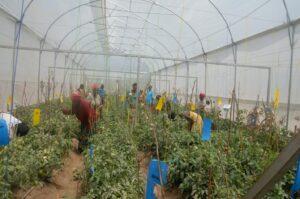Every year, International Rural Women’s Day, celebrated on October 15, reminds us of the importance of women in sustainable development, particularly in rural areas.
As part of the Action Climatique Féministe – Afrique de l’Ouest (ACF-AO) project, we are highlighting the essential role played by rural women in combating the effects of climate change.
Rural women, guardians of biodiversity


INADES-Formation/ Bamby Traoré – stocking cassava for attiéké in Braffedon and smoking fish in Grand-Lahou
Rural women are often the first to feel the impact of climate change. As the main managers of natural resources in their communities, they play a crucial role in preserving biodiversity and ecosystems.
Their traditional knowledge of sustainable farming practices is invaluable for environmental protection. These practices not only contribute to food security, but also help maintain the balance of local ecosystems.
As part of the ACF-AO project, we are committed to building the capacity of rural women to adapt to climate change. This includes training in agroecological practices, enabling them to improve productivity while preserving natural resources. By training them in resource management, crop diversification and the use of appropriate tools, we foster their individual resilience. This empowerment also benefits their families and communities, as they become vectors of change and innovation.
The power of advocacy and concrete action

INADES-Formation/ Bamby Traoré – Braffedon women’s advocacy preparation
Rural women are also influential spokespersons for their communities. By involving them in political advocacy on climate issues, we give them a voice in the decisions that affect their daily lives. Their unique experience and perspective are essential for more inclusive and effective environmental policies.
The ACF-AO project supports initiatives that enable rural women to participate actively in local governance and ecosystem management. Actions such as training in women’s leadership, self-confidence and public speaking facilitate their involvement in local decision-making bodies concerning environmental issues. In addition, initiatives such as the creation of nurseries for reforestation, or raising awareness of sustainable practices, help to strengthen their climate resilience.
These initiatives not only strengthen climate resilience, but also promote a culture of solidarity and support within communities. By raising women’s awareness of sustainable practices and providing them with the tools to implement them, we create a network of women committed to protecting their environment and resources.
Conclusion
The ACF-AO project is proud to highlight the indispensable role of rural women in the fight against climate change. By supporting and empowering them, we are building together a future where every voice counts and every action has an impact.
The contribution of rural women to resilience in the face of climate change is undeniable. By investing in their empowerment and recognizing their role, we are not only taking a step towards gender equality, but also strengthening the ability of communities to adapt and thrive in the face of environmental challenges. On this special day, let’s commit to celebrating and empowering rural women in all our initiatives.
Djimby Sow / Communication Department – General Secretariat











